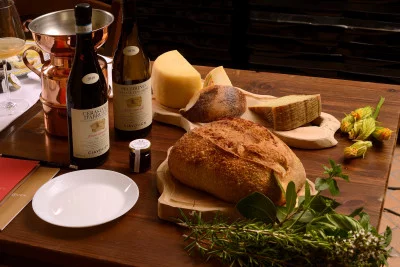Ciavolich Azienda Agricola
(Winery in Montepulciano d'Abruzzo)
Reviews
Accoglienza super
Liliam
Posto magnifico Eccezionale accoglienza e gentilezza. Vini...
Eccezionale accoglienza e gentilezza. Vini ottimi e posto curato e panoramico. Abbiamo mangiato e bevuto benissimo ed i bimbi si sono stra-divertiti. A presto Ciavolich!
Source: google Sergio Marchionni
Accoglienza fantastica! Location suggestiva
Source: google Fabrizio Cingolani
Buon gusto e tradizione per un'accoglienza fuori...
Source: google Maurizio Pecorare
About Winery and Wines
The Ciavolich family is an ancient family of wool merchants of Bulgarian origin who arrived in Miglianico, Italy, in 1560. They became landowners in 1700. In 1853, Francesco Ciavolich built his first winery, which today is one of the most ancient and suggestive of Abruzzo. At the end of the 1800s, the marriage between Giuseppe Ciavolich and the noblewoman Ernestina Vicini marked the turning point for the farm in Loreto Aprutino. The latter hosted, in her palace in Chieti, one of the most active literary salons of the beginning of the century, receiving friends such as Francesco Paolo Michetti and Costantino Bardella. Her son Giustino took care of the family's agricultural estates, passing them on to his son Giuseppe. In 1943, the Germans established their headquarters in the Miglianico palace. The family took refuge in the underground cellar. In the '60s, the family inherited from Donna Ernestina the estate of Loreto Aprutino. Here Giuseppe Ciavolich planted the vineyards of Montepulciano, Trebbiano and Cococciola that today Chiara Ciavolich continues to cultivate in order to tell an ancient story through her wine, a red thread linking past, present and future.
Nowadays, in Loreto Aprutino, in Contrada Salmacina, the heart of the Ciavolich estate’s production is found. A total of 35 hectares of vineyards, 3 hectares of olive groves and 10 hectares of arable land surround the Ciavolich winery and farmstead. The 35 hectares of vineyards are divided equally between vines planted with pergola Abruzzese from missal selection and vines with guyot from clonal selection. In recent years, the winery has started working to enhance the original genetic heritage of the vines that were planted in the estate in the 1960s.

Services
Wine Sale
Accommodation